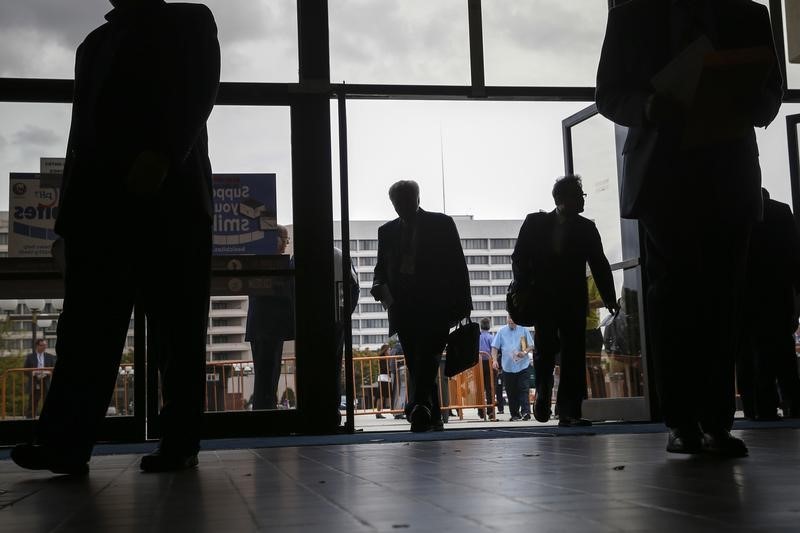(Repeats Oct 28 item, no change to content)
By Lewis Krauskopf
NEW YORK, Oct 28 (Reuters) - The long, dark tunnel that has been the U.S. presidential election campaign for biotechnology stocks appears to have no bright light beckoning the sector's beleaguered shareholders to a welcoming end.
With the race winding down and most national opinion polls predicting victory for Democrat Hillary Clinton over Republican Donald Trump and probable gains for other Democrats in Congress, biotech shares are once again on the back foot, and investors say prospects for a sustained recovery look dim.
Clinton, whose pointed criticisms of drug pricing have weighed on the industry for more than a year, has promised tougher oversight, and any big gains for her party on Capitol Hill would only strengthen her hand in that cause.
The Nasdaq Biotechnology Index .NBI is down more than 8 percent so far in October and 21 percent in 2016, with investors predicting more downside should Democrats actually pull off a total victory on Nov. 8, capturing both the White House and Congress.
But even the most likely election scenario, seen as Clinton winning the presidency and Republicans retaining at least one chamber of Congress, could spur only a modest - and short-lived - rally in the sector on the premise that Republicans would put a check on her ability to pass pricing laws.
"I think you get some recovery if the Republicans keep the House or either they keep the Senate, or just keep it close to 50-50," said Jeff Jonas, a portfolio manager with Gabelli Funds in Rye, New York.
Still, the prospect remains that a Clinton administration would try to enact some reforms, perhaps through executive actions that require no congressional approval, Jonas said. "I still think there is going to be an overhang in the next year," he said.
IT STARTED WITH A TWEET
Healthcare investors have been on edge since Sept. 21, 2015, when Clinton tweeted about specialty drug "price gouging."
That sent biotech shares crashing. Since then, political and news media scrutiny of drug prices has pressured biotech shares, as well as those of specialty pharmaceutical companies such as Valeant Pharmaceuticals International Inc (NYSE:VRX) VRX.TO VRX.N .
From the date of Clinton's tweet, Nasdaq-listed biotech shares have lost a quarter of their value. In contrast, a key gauge of health stocks more broadly .SPXHC is down by just 2 percent and the wider S&P 500 .SPX is 9 percent higher.
Investors have yanked more than $23 billion from health-related mutual funds and exchange-traded funds (ETFs) since September 2015, according to Lipper data. The biggest U.S. biotech-focused fund, the $10.4 billion Fidelity Select Biotechnology Portfolio FBIOX.O has seen investors withdraw funds in 12 of the last 13 months, totaling nearly $2.4 billion in redemptions.
Just this month a tweet by Clinton's onetime Democratic primary opponent, U.S. Senator Bernie Sanders, alleging greed by Ariad Pharmaceuticals Inc ARIA.O because of its pricing of its leukemia drug sent shares of the biotech company tumbling 15 percent in one day. In all, the stock has lost about one-third of its value since the tweet from Sanders, who stands to gain clout in a Democrat-controlled Senate.
"A Clinton presidency would at least weigh somewhat on biotech stocks," said David Swank, chief investment officer at Hood River Capital Management in Portland, Oregon.
While Republicans controlling at least one chamber of Congress will prevent major legislation, Swank said, "it's more likely to be a situation of continued jawboning from D.C. casting a cloud over the industry and perhaps leading to some self-imposed restraints (by companies) on drug pricing."
NOT JUST PRESIDENTIAL POLITICS
Another Election Day decision could blunt any momentum for the stocks. California, the country's most populous state, will vote on a referendum aimed at reining in drug prices that could lead other states to follow should it pass. from the uncertain political climate, a few recent high-profile clinical setbacks, including for Bristol-Myers Squibb Co BMY.N , have shaken investor confidence in the industry, said Teresa McRoberts, portfolio manager at Fred Alger Management in New York.
After the election, "we might see some relief rally, but I do not know how durable or sustainable it's going to be," McRoberts said. "It's not just politics; there's some fundamentals that just haven't been there."
Of course, Trump could prove the polls wrong and prevail. In that scenario, coupled with a Republican sweep in Congress, analysts expect the stocks to rally or at least outperform what many see as broader market weakness on so surprising a result. That is because Trump has had relatively little focus on drug pricing during the campaign.
But some investors see Trump's populism as a risk, and some Republicans have been critical of drug pricing.
"We at least have an idea of what to expect if Hillary wins. For Donald, it would be more of the unknown," said David Heupel, a healthcare analyst at Thrivent Financial in Minneapolis, who thinks the stocks would get a bump up in a Trump victory.
Indeed, whatever the outcome on Nov. 8, investors in one corner of the market expect continued volatility at the least.
The implied volatility for equity options in the iShares Nasdaq Biotechnology ETF IBB.O was recently at its highest level since June. Prices for put and call options closest to the ETF's current level suggest the group could see a swing of nearly 6 percent, up or down, between now and the Friday after the election.
<^^^^^^^^^^^^^^^^^^^^^^^^^^^^^^^^^^^^^^^^^^^^^^^^^^^^^^^^^^^ Biotech stocks since Hillary's Clinton's "price gouging" tweet
http://tmsnrt.rs/2fjkbcv
^^^^^^^^^^^^^^^^^^^^^^^^^^^^^^^^^^^^^^^^^^^^^^^^^^^^^^^^^^^>
